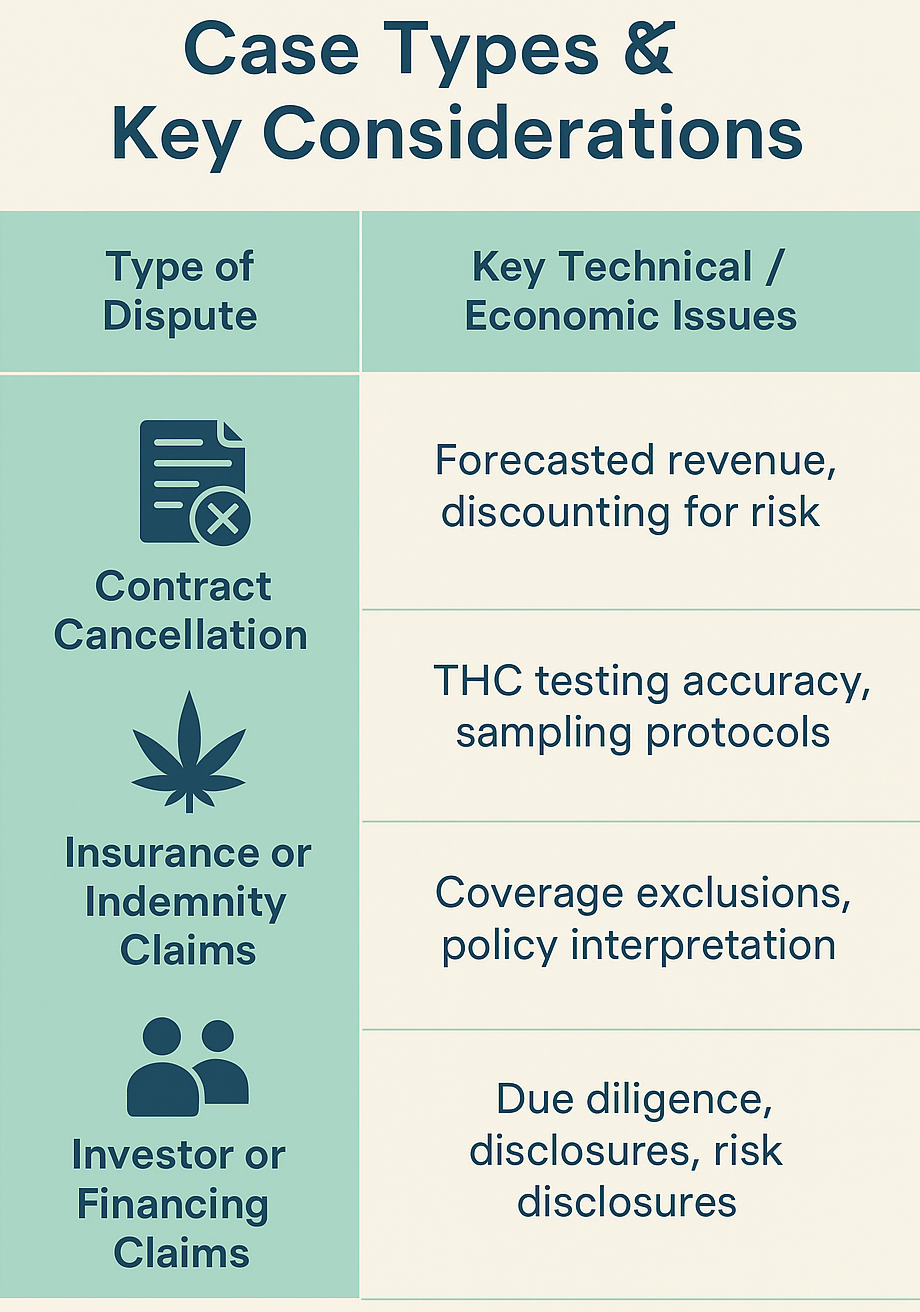Hemp Litigation and Economic Damages: Legal Risk in the Courtroom
This article discusses: Legal Risk Exposure Heightens Uncertainty in Developing U.S. Hemp Markets by Skorbiansky, Thornsbury and Camp, published in Choices (Quarter 2021) from the Agricultural & Applied Economics Association. (Access for $19.50/month)
The growth of the U.S. hemp and cannabis industry has spawned a parallel increase in litigation and regulatory disputes. As attorneys, insurers, and businesses analyze claims involving lost contracts, ruined crops, or investor losses, they increasingly seek expert testimony that can untangle complex scientific, regulatory, and economic threads.
Below, we explore an article published in Choices, venturing into the core risk dynamics in hemp markets, how they feed into economic damages, and why a well-credentialed expert is often essential in these cases.
The Unique Legal Risk in Hemp & Cannabis
Hemp is unlike most crops: it can transform from a legal agricultural product to a controlled substance if THC levels exceed 0.3%. That threshold is not an academic concern—it directly leads to crop destruction, regulatory penalties, and contract rescissions.
Many producers face the prospect of destroying crops when “hot” test results push them above the legal THC limit.
The uncertainty of acceptable testing protocols, lab methods, and chain-of-custody further magnifies risk.
The interlocking risk of regulatory noncompliance can cascade into financial ruin, especially without insurance or credit backups.
These legal uncertainties are not just agricultural—they are economic. They increase volatility, reduce predictability, and make contract valuation far more complex.
Amplified Market Uncertainty: Price, Yield, and Access to Capital
The legal risk overlays other inherent uncertainties in hemp and cannabis markets:
Yield & Quality Risk: Genetics, environment, pests, and plant variability can push THC levels or affect biomass yield.
Market & Price Risk: Hemp and CBD product prices have fluctuated wildly—e.g. CBD isolate prices plunged in recent years.
Financial & Insurance Risk: Many hemp businesses struggle to secure loans, lines of credit, or insurance that account for THC volatility.
When disputes arise—say, a buyer cancels a contract or a crop is destroyed—these layers of uncertainty complicate damage calculations. Was the lost revenue based on speculative future market prices? Should it reflect discounting for risk?
How Expert Witnesses Add Value in Cannabis & Hemp Cases
Cannabis and hemp litigation often pit technical science against commercial reality. A credible expert bridges that gap by:
Reconstructing plant growth cycles, lab testing, and sampling protocols
Assessing whether industry standards and best practices were followed
Explaining analytical chemistry, THC assays, and regulatory thresholds to lay audiences
Quantifying economic damages—projected losses, mitigation, discounting for risk
In particular, expert testimony is often decisive in disputes over contracts, crop destruction, investor claims, or insurance coverage. Courts, insurers, and opposing counsel expect clear, defensible models rooted in accepted scientific, regulatory, and economic norms.
You can see how these issues play out in recent commentary such as “The Rise of Hemp Litigation: Courts Hit Pause on CBD Lawsuits.”
Case Types & Key Considerations
Common Areas of Hemp Litigation
Hemp may have been legalized in the 2018 Farm Bill, but the courtroom tells a different story. From farmers suing over “hot” crops destroyed at harvest, to seed companies accused of selling genetics that never had a chance of staying compliant, to states clashing with businesses over intoxicating hemp derivatives like delta-8 and THCA, litigation has become as much a part of the hemp industry as cultivation and extraction. The disputes span a wide range of issues—regulatory thresholds, contracts gone sour, labeling and consumer safety, and even zoning fights over where hemp can be grown or processed. Below are some of the most common areas where hemp litigation continues to shape the industry.
Regulatory Compliance & THC Thresholds
Crops testing “hot” (above 0.3% THC) and being ordered destroyed.
Disputes over sampling methods, laboratory accuracy, or whether remediation is allowed.
State vs. federal authority clashes (e.g., DEA involvement in “work-in-progress hemp extract”).
Contract & Commercial Disputes
Broken supply chain agreements between farmers, processors, and distributors.
Claims of non-payment, delivery of non-compliant biomass, or failure to meet quality standards.
Disputes over forward contracts where market prices collapse.
Seed & Genetics Misrepresentation
Lawsuits over seed providers selling “certified” or “compliant” hemp seeds that later test above THC limits.
IP disputes over proprietary strains and whether hemp genetics can be patented or trademarked.
Product Liability & Consumer Safety
Litigation involving mislabeled hemp-derived products (CBD potency, contaminants, etc.).
Claims of harm from synthetic cannabinoids, delta-8 THC, or adulterated hemp products.
Landlord–Tenant & Zoning Issues
Lease disputes for hemp cultivation or processing facilities.
Local bans conflicting with state hemp authorization.
Insurance & Crop Loss Claims
Farmers seeking coverage for destroyed crops.
Arguments over whether “hot hemp” is insurable.
Interstate & International Trade
Conflicts over transporting hemp across states where enforcement varies.
Export/import disputes tied to phytosanitary rules or narcotics laws abroad.
Reducing Risk Outside Litigation
While litigation is sometimes inevitable, businesses should proactively manage risk according to Skorbiansky, Thornsbury and Camp:
Use consistent, accredited THC testing labs, with transparent chain-of-custody
Diversify revenue streams to avoid dependency on a single buyer or product
Price contracts with THC risk premiums or force majeure triggers
Monitor regulatory developments and guidance from agencies on acceptable variance
Even with these measures, disputes will occur. The difference is that prepared parties are better armed with appropriate experts, to survive and prevail.
The information provided in this article is for educational and informational purposes only and does not constitute legal advice. Reading this post does not create an attorney–client relationship. Individuals or businesses facing hemp or CBD-related litigation should consult with a qualified attorney for advice regarding their specific situation.
